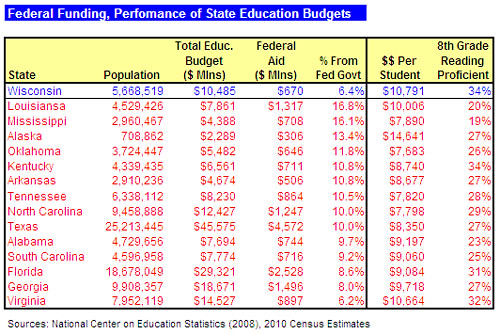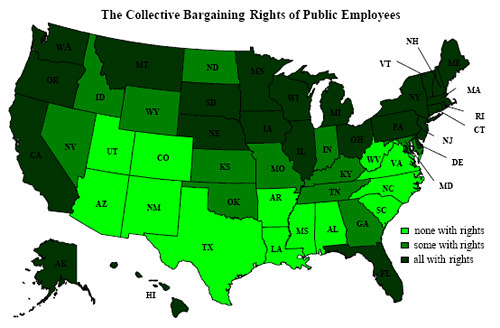A word of advice to conservatives desperately trying to smear teachers and other public employees in Wisconsin: when trapped in a hole, first stop digging. On Monday, the right-wing blogosphere made the mistake of complaining that Wisconsin received millions of dollars in federal education aid when solidly Republican red states get much, much more. Now, the would-be Republican union busters are whining that Badger state students can't read. As it turns out, Wisconsin students outperform their counterparts in those reddest of states where collective bargaining rights are few - or non-existent.
A day after he inadvertently drew attention to the persistent phenomenon of "red state socialism" (that is, the one-flow of federal tax dollars from Washington DC to heavily Republican states), Terence Jeffrey of CNS News protested that "two-thirds of Wisconsin eighth graders can't read proficiently." The implication, of course, is that the unacceptable scores are the fault of overpaid, undeserving public school teachers:
Two-thirds of the eighth graders in Wisconsin public schools cannot read proficiently according to the U.S. Department of Education, despite the fact that Wisconsin spends more per pupil in its public schools than any other state in the Midwest.In the National Assessment of Educational Progress tests administered by the U.S. Department of Education in 2009--the latest year available--only 32 percent of Wisconsin public-school eighth graders earned a "proficient" rating while another 2 percent earned an "advanced" rating. The other 66 percent of Wisconsin public-school eighth graders earned ratings below "proficient," including 44 percent who earned a rating of "basic" and 22 percent who earned a rating of "below basic."
Sadly for Jeffrey and his right-wing echo chamber, the data show that Wisconsin schoolchildren out-read the kids in states where Republicans poll best and public workers have the fewest collective bargaining rights. Those know-nothing red states also happen to be where the federal government most heavily subsidizes the local education systems.
The numbers - and the electoral map - tell the tale. According to the National Center for Education Statistics, Wisconsin does in fact spend more per student than some of its Midwestern neighbors even as its pupils score less well. But with 34% of its eighth graders students at or above the target reading proficiency, Wisconsin far outperforms the Republicans' solid south (and the national average of 30%). Only Kentucky, which receives substantially more money from DC can match Wisconsin's scores.
Just as telling, the woefully inadequate per student spending levels are propped up only by generous federal spending provided by blue state tax payers. Meanwhile, the bluest of states in the Northeast spend more and get what they pay for. In Connecticut, 43% of eighth graders are at or above reading proficiency. The Nutmeg state spends $14,610 per pupil per year. New Hampshire (39%, $11,951), Vermont (40%, $14,421) New Jersey (42%, $17,620), Pennsylvania (40%, $11,741) and Massachusetts (42%, $13,667) pay the price for better educational outcomes.
At their assault on union rights continues in Wisconsin, so too does conservatives' vile and baseless scapegoating of teachers there. But sadly for the right-wingers trying to smash the unions in Madison, Americans have already seen the future with today's failure in Alabama, Mississippi, Alaska and the other states Republicans call home.



